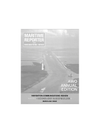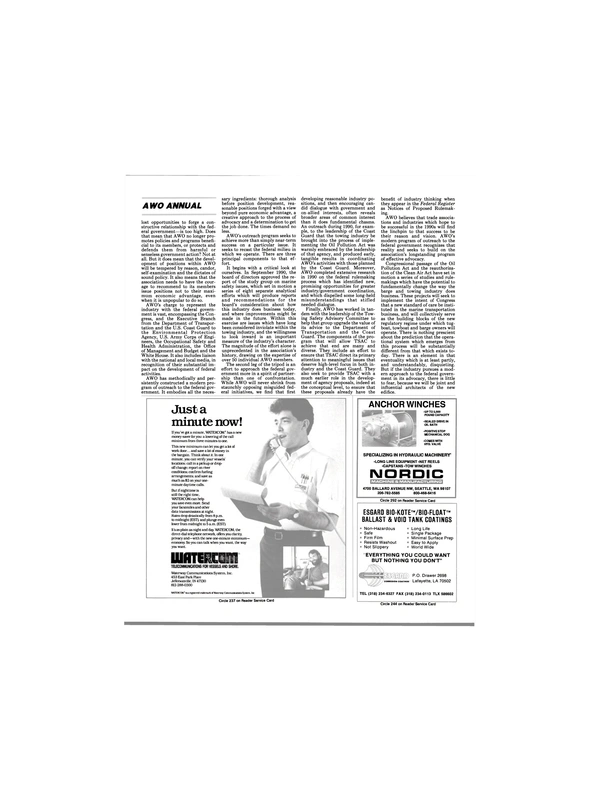
A New Approach To Issue Advocacy
Issue advocacy is the heart and soul of what a trade association does. A good trade association effectively promotes policies and programs which are beneficial to its members' interests, and it protects and defends its members from governmental initiatives which are harmful or senseless. At its essence, that is why companies voluntarily elect to belong to a trade association, and fund it with monies that could otherwise be funneled directly back into a company's bottom line.
The return which trade association members expect on this investment is professional and effective issue advocacy.
There is nothing terribly new about this. The relationship between a trade association and its members, and the expectations that generally accompany membership, have been in place for many years.
But there is something fresh about the modern criteria which define effective advocacy. In the not too distant past, a trade association could evaluate its success by the special interests of its members, and the extent to which federal laws and regulations promoted or constrained those special interests.
That no longer is, nor should be, the sole measure of effective advocacy and a successful trade association.
The contemporary yardstick by which trade associations should be judged is much more complex. It includes the special interest measure as only one piece of a larger mosaic. And, that mosaic is largely defined by a broader vision and a longer range perspective. AWO tries to pursue its advocacy with the federal government with that vision and perspective in mind.
A modern outreach program to the federal government—the Congress and the Executive Branch— must be grounded by an overriding principle of honesty and integrity in an association's work. Credibility is the keystone of effective issue work.
Sometimes a modern advocacy program will result in industry positions which do not return to the members the maximum economic advantage that would result from a position which is hammered out with the special interest criterion as the driving force. AWO understands the allure of special interest advocacy.
But we believe the cost it bears—diminished credibility and lost opportunities to forge a constructive relationship with the federal government—is too high. Does that mean that AWO no longer promotes policies and programs beneficial to its members, or protects and defends them from harmful or senseless government action? Not at all. But it does mean that the development of positions within AWO will be tempered by reason, candor, self-examination and the dictates of sound policy. It also means that the association needs to have the courage to recommend to its members issue positions not to their maximum economic advantage, even when it is unpopular to do so.
AWO's charge to represent the industry with the federal government is vast, encompassing the Congress, and the Executive Branch from the Department of Transportation and the U.S. Coast Guard to the Environmental Protection Agency, U.S. Army Corps of Engineers, the Occupational Safety and Health Administration, the Office of Management and Budget and the White House. It also includes liaison with the national and local media, in recognition of their substantial impact on the development of federal activities.
AWO has methodically and persistently constructed a modern program of outreach to the federal government.
It embodies all the necessary ingredients: thorough analysis before position development, reasonable positions forged with a view beyond pure economic advantage, a creative approach to the process of advocacy and a determination to get the job done. The times demand no less.
AWO's outreach program seeks to achieve more than simply near-term success on a particular issue. It seeks to recast the federal milieu in which we operate. There are three principal components to that effort.
It begins with a critical look at ourselves. In September 1990, the board of directors approved the report of the study group on marine safety issues, which set in motion a series of eight separate analytical efforts which will produce reports and recommendations for the board's consideration about how this industry does business today, and where improvements might be made in the future. Within this exercise are issues which have long been considered inviolate within the towing industry, and the willingness to look inward is an important measure of the industry's character.
The magnitude of the effort alone is unprecedented in the association's history, drawing on the expertise of over 50 individual AWO members.
The second leg of the tripod is an effort to approach the federal government more in a spirit of partnership than one of confrontation.
While AWO will never shrink from staunchly opposing misguided federal initiatives, we find that first developing reasonable industry positions, and then encouraging candid dialogue with government and on-allied interests, often reveals broader areas of common interest than it does fundamental chasms.
An outreach during 1990, for example, to the leadership of the Coast Guard that the towing industry be brought into the process of implementing the Oil Pollution Act was warmly embraced by the leadership of that agency, and produced early, tangible results in coordinating AWO's activities with those planned by the Coast Guard. Moreover, AWO completed extensive research in 1990 on the federal rulemaking process which has identified new, promising opportunities for greater industry/government coordination, and which dispelled some long-held misunderstandings that stifled needed dialogue.
Finally, AWO has worked in tandem with the leadership of the Towing Safety Advisory Committee to help that group upgrade the value of its advice to the Department of Transportation and the Coast Guard. The components of the program that will allow TSAC to achieve that end are many and diverse. They include an effort to ensure that TSAC direct its primary attention to meaningful issues that deserve high-level focus in both industry and the Coast Guard. They also seek to provide TSAC with a much earlier role in the development of agency proposals, indeed at the conceptual level, to ensure that these proposals already have the benefit of industry thinking when they appear in the Federal Register as Notices of Proposed Rulemaking.
AWO believes that trade associations and industries which hope to be successful in the 1990s will find the linchpin to that success to be their reason and vision. AWO's modern program of outreach to the federal government recognizes that reality and seeks to build on the association's longstanding program of effective advocacy.
Congressional passage of the Oil Pollution Act and the reauthorization of the Clean Air Act have set in motion a series of studies and rulemakings which have the potential to fundamentally change the way the barge and towing industry does business. These projects will seek to implement the intent of Congress that a new standard of care be instituted in the marine transportation business, and will collectively serve as the building blocks of the new regulatory regime under which tugboat, towboat and barge owners will operate. There is nothing prescient about the prediction that the operational system which emerges from this process will be substantially different from that which exists today.
There is an element in that eventuality which is at least partly, and understandably, disquieting.
But if the industry pursues a modern approach to the federal government in its advocacy, there is little to fear, because we will be joint and influential architects of the new edifice.
Read A New Approach To Issue Advocacy in Pdf, Flash or Html5 edition of March 1991 Maritime Reporter
Other stories from March 1991 issue
Content
- Avondale Industries Joins International Shipbuilding Partnership page: 5
- Chevron Awards Grootint $111 Million Contract For North Sea Platform page: 5
- Fincantieri Receives Products Carrier Contract Worth $53.5 Million page: 8
- Icebreaker/Passenger Ferry To Be Built By Marystown Yard In Newfoundland page: 8
- Meyer Werft Delivers Fourth Gas Carrier In Series Of Six For USSR page: 10
- Trinity Marine Receives Over $138 Million In Navy Contracts page: 10
- Service Marine To Build 145-Foot Utility Boat For Gilbert Cheramie Boats page: 11
- Sperry Gyrocompass System Receives NMEA Product Award page: 11
- New Prototype Rescue Vessel, Built By Textron Marine For USCG, Credited With Saving Four Lives page: 12
- Avondale Christens 10th In Series Of 16 Auxiliary Fleet Oilers Under Construction For U.S. Navy page: 14
- Atlantic Marine Launches Casino Riverboat 'Emerald Lady' page: 16
- Ingalls Awards Baldt Contracts For Anchor, Chain And Hardware page: 18
- Marine Industries Mobilizes Large RO/RO Barges page: 18
- The Voice Of America's Towing & Barge Industry page: 20
- Teamwork, Creativity And Determination page: 21
- A New Approach To Issue Advocacy page: 21
- The Environmental Wave: Successes And Challenges page: 24
- Effects On The U.S. Fishing Industry By The Anti-Reflagging Act Of 1987 page: 26
- Peterson Builders Sign NSRP Cooperative Agreement With Navy page: 27
- Gulf Copper To Provide Facility, Services For FPSO Conversion page: 27
- MAN B&W Diesel Moves To New USA Headquarters page: 27
- Jacksonville Shipyards Awarded $2.5 Million To Repair Pemex Ship page: 28
- Newport News Names Hardison VP, Quality page: 33
- Avondale Boat Division Licensed To Construct High-Speed Hovercraft page: 33
- Rolla Introduces New Surface Piercing 'Super Propellers' page: 34
- TOWFISH SCANS SEABED— page: 34
- Navy Requests $25 Billion For Shipbuilding, Fleet Maintenance & Repair For FYs 92-93 page: 36
- ASNE 5th Annual Naval Logistics Symposium page: 38
- MAJOR NAVY CONTRACTS page: 39
- U.S. Yards Awarded Navy Ship Repair Pacts page: 40
- 'Arleigh Burke,' First Aegis Destroyer, Conducts Weapons Trials In Atlantic page: 41
- Saab Marine Level Gauges For Navy Oilers page: 41
- PBI Launches MCM-10, USS Warrior, Seventh in Series Of 11 For Navy; Lays Keel For MCM-12, USS Ardent page: 44
- James N. Miller Signs Swath Ocean Agreement page: 46
- Ulstein Hatloe Delivers Polar Research/Passenger Vessel To Rieber Shipping page: 47
- Amoco, China Sign Joint Agreement To Undertake $500 Million Oil Project page: 47
- Norwegian Partners Buy Six Soviet-Owned Carriers For Over $100 Million page: 47
- Sources Of U.S. Oil Imports And U.S. Oil Companies' Role In The Mideast page: 48
- NAVIGATION & COMMUNICATIONS EQUIPMENT page: 50
- Marine Hydraulics International Performs Extensive Navy, Commercial Ship Repairs page: 64
- Hardigg's Rack-Mount Container Protects Electronic Marine Equipment In Transport/Storage page: 64
- Energy And Economic Security page: 66
- Viking Fender Co. Celebrates Anniversary—Introduces New Workboat Fendering System page: 68
- TANO Introduces Mil-Spec VME Modules —Literature Available page: 69
- AESA Delivers World's Largest Tuna Purse Seiner page: 70
- Panama Canal Installs Marine Fendering System From Solidur Plastics page: 70
- Micronautics Offers Free Literature On Tide Predicting Software page: 70
- RGB Spectrum Announces New Flexible Scan Converter page: 71
- Walport USA Announces New Video Safety Service page: 71
- MagneTek Purchases Rights To IBM Electronic Bus-Transfer Technology page: 73
- Aqua Signal Develops New Computer-Controlled Shipboard Lighting System page: 73
- Chris Marine Celebrates 10th Anniversary In Jacksonville, Florida page: 74
- Deutz-Powered High-Speed Xatafoil' Yacht Under Construction At T-Craft page: 81


